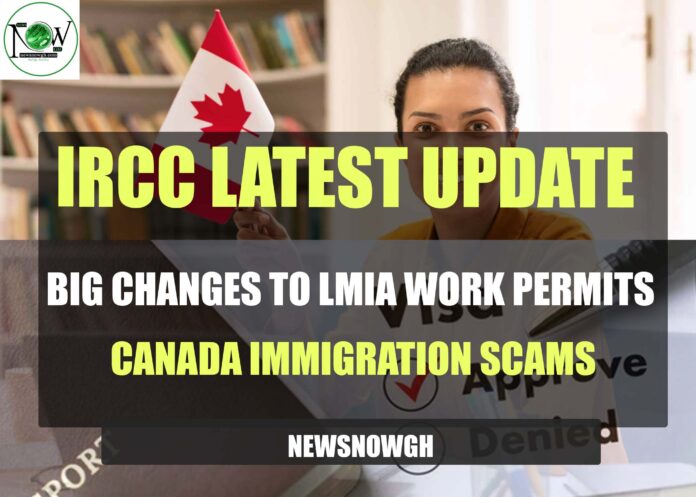Big Changes to LMIA Work Permits: Canada Immigration Scams | IRCC Latest Update
We will examine the latest announcement made by Minister Randy Boissonnault about additional steps being taken to combat fraud in Canada’s Temporary Foreign Worker Program (TFWP) in this post. These modifications are part of a larger effort to guarantee the program’s efficacy and integrity, protecting Canadian companies as well as foreign employees.
Overview of the Temporary Foreign Worker Program (TFWP)
An essential instrument for addressing labor shortages in the nation when competent Canadian workers aren’t available to fill job openings is Canada’s Temporary Foreign Worker Program (TFWP). Employers can temporarily fill labor shortages by hiring foreign workers thanks to this policy. Employers must, however, treat staff members with respect and decency and provide a safe and healthy work environment.
Fresh Approaches to Combat Fraud and Abuse
The announcement made by Minister Boissonnault recently represents a major advancement in the fight against fraud and abuse inside the TFWP. The Canadian government is dedicated to improving the program’s accountability and transparency to safeguard the rights of foreign workers and make sure that Canadian employers follow the regulations. The following are the main measures being executed:
- Enforcing the 20% Cap Policy: The government of Canada will ensure that employers abide by the 20% cap regulation. This regulation restricts how many temporary foreign employees a business can have. For employees who wish to apply for permanent residency, it is quite crucial. Employers who use this program will be subject to more regulations. This guarantees that the system is not abused by them.
- Tighter Supervision in High-Risk Locations: The government will monitor high-risk locations more closely. This involves reviewing Labor Market Impact Assessment (LMIA) applications. They plan to carry out additional workplace checks. This aids in the early detection of any fraudulent activity. Furthermore, it guarantees that only legitimate applications are accepted.
- Examining LMIA Fee Increases: The government is considering increasing the costs associated with filing LMIA applications. More inspections will be funded in part by the additional funds. To maintain the program’s integrity, it will also assist other initiatives. The system will become more robust and secure as a result.
- Employer Qualifications: It may be necessary to adopt new regulations to determine if an employer can hire foreign nationals. The length of the company’s operation will be examined by the authorities. They will also see whether there have been any recent layoffs at the company. Foreign workers will only be hired by companies with a solid performance history.
- Refusal to Process Under Low-Wage Stream: In some circumstances, the government may decide not to forward applications that are submitted under the low-wage stream. This would be relevant to employers in particular sectors or domains. An employer may not be permitted to use the TFWP if they have a history of misusing it. This measure makes sure that foreign workers can only be hired by those who truly need them.
TFWP Modernization
The Canadian government is working to update the TFWP with a new foreign worker stream intended exclusively for agriculture and fish and seafood processing, in addition to the previously mentioned steps. This strategy, which was unveiled in Budget 2022, seeks to preserve the program’s integrity while more effectively addressing the particular labor needs of certain industries.
Fighting Embezzlement and Abuse
The government uses a variety of strategies to fight fraud and abuse inside the TFWP. For instance, there has been a noticeable improvement in the caliber and promptness of employer inspections, which has resulted in a 36% rise in fines imposed in the fiscal year 2023–2024 over the prior one. Each infraction carries a charge of $500 to $100,000, and businesses may be hit with fines of up to $1 million a year.
Furthermore, on an accessible website run by Immigration, Refugees, and Citizenship Canada (IRCC), the government keeps an up-to-date list of employers who do not comply with the law. This openness safeguards both foreign workers and the Canadian labor market by holding wrongdoers accountable.
Mechanisms for Reporting and Public Awareness
The government has also launched several initiatives to raise public awareness of fraud, such as “Know the Rules Before You Apply,” which is aimed at prospective immigrants from nations like India.
Furthermore, Employment and Social Development Canada (ESDC) maintains a confidential tip line that is staffed around the clock and offers assistance in more than 200 languages. Employees and interested parties can report instances of abuse, mistreatment, or suspected program misuse anonymously by calling this tip line.
Conclusion
Minister Boissonnault has made a substantial contribution to preserving the integrity of Canada’s Temporary Foreign Worker Program with the implementation of these additional restrictions. These initiatives demonstrate the government’s commitment to upholding the interests of Canadian companies while defending the rights of international workers.
These steps are anticipated to ensure the TFWP’s long-term viability and success by fostering a more open and safe environment within the program.
Follow us on Newsnowgh.com to stay updated on the latest information regarding work permits, visa application processes, paths to permanent residency, and visa-sponsored employment.


